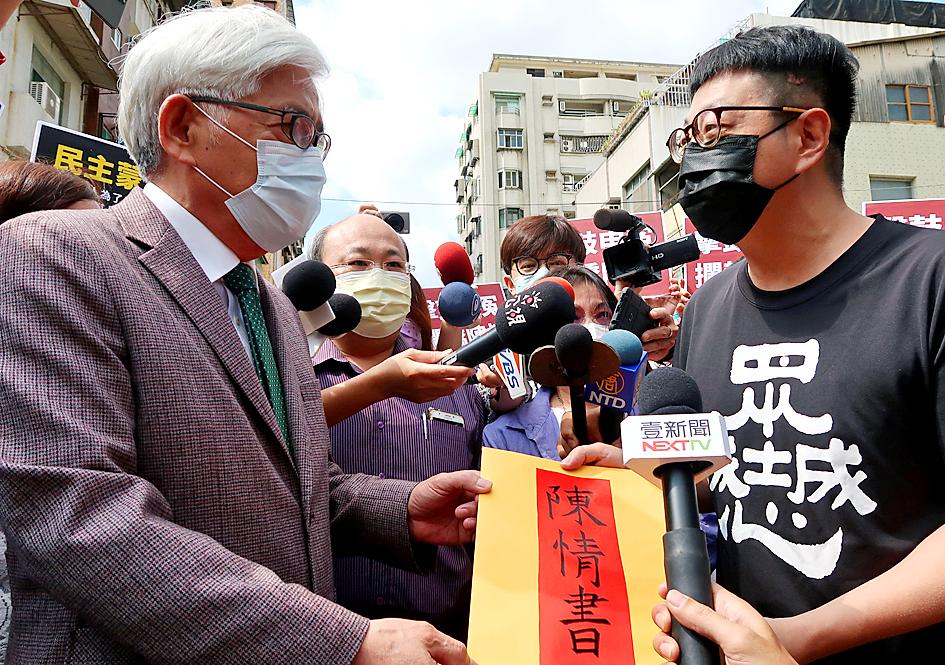The Central Election Commission (CEC) yesterday reached an agreement with the Kaohsiung City Election Commission to set up the same 1,823 polling stations used in 2018’s Kaohsiung mayoral election for the June 6 vote to recall Kaohsiung Mayor Han Kuo-yu (韓國瑜).
The arrangement was reached as some venue hosts retracted their agreements to provide space for polling stations.
As of Thursday, the Kaohsiung commission had only obtained permission to use 64.8 percent of the venues that it expects would be needed for the recall vote.

Photo: CNA
It has also drawn criticism for announcing that elementary and junior-high schools would only be allowed to provide two classrooms as polling stations, saying that it would help prevent the spread of COVID-19.
Kaohsiung Deputy Mayor Chen Hsiung-wen (陳雄文), the Kaohsiung commission’s head, yesterday said that it had encountered “considerable difficulty” in trying to secure space for polling stations, as only about half of the 900 schools have agreed to provide classrooms.
CEC Chairman Lee Chin-yung (李進勇) yesterday visited Kaohsiung to help resolve the issue.
“Wherever people voted in the 2018 [Kaohsiung] mayoral election is where they will vote in the recall vote,” Lee said. “That is treating voters with respect.”
Chen said that the CEC could help the Kaohsiung commission solicit space from national universities or government agencies to be used as polling stations.
He also asked the central government to assist the Kaohsiung commission with disinfecting polling stations after the vote.
Lee asked Chen to tally universities and government agencies that are willing to provide space for the vote, adding that “if they turn down the requests, I will chop my head off.”
After a discussion lasting two-and-a-half hours, the agencies reached four agreements, CEC Vice Chairman Chen Chao-chien (陳朝建) said.
First, 1,823 polling stations are to be set up, and Kaohsiung district officers are to report the venues they have secured to the Kaohsiung commission by Tuesday next week, he said.
Second, for the sake of voters’ convenience, the polling stations should, in principle, be set up at the same locations as in the 2018 election, he said.
Third, as the Civil Servant Election and Recall Act (公職人員選舉罷免法) says that government agencies, schools and civil servants are crucial to ensuring that people can exercise their right to political participation, the Kaohsiung Education Bureau should send a letter to schools at all levels asking them to provide classrooms to be used as polling stations, he said.
Fourth, all Kaohsiung district offices must abide by the COVID-19 prevention plan established by the Kaohsiung commission and introduced at public hearings to ensure that proper disease prevention work is carried out during the vote.

CHAOS: Iranians took to the streets playing celebratory music after reports of Khamenei’s death on Saturday, while mourners also gathered in Tehran yesterday Iranian Supreme Leader Ayatollah Ali Khamenei was killed in a major attack on Iran launched by Israel and the US, throwing the future of the Islamic republic into doubt and raising the risk of regional instability. Iranian state television and the state-run IRNA news agency announced the 86-year-old’s death early yesterday. US President Donald Trump said it gave Iranians their “greatest chance” to “take back” their country. The announcements came after a joint US and Israeli aerial bombardment that targeted Iranian military and governmental sites. Trump said the “heavy and pinpoint bombing” would continue through the week or as long

TRUST: The KMT said it respected the US’ timing and considerations, and hoped it would continue to honor its commitments to helping Taiwan bolster its defenses and deterrence US President Donald Trump is delaying a multibillion-dollar arms sale to Taiwan to ensure his visit to Beijing is successful, a New York Times report said. The weapons sales package has stalled in the US Department of State, the report said, citing US officials it did not identify. The White House has told agencies not to push forward ahead of Trump’s meeting with Chinese President Xi Jinping (習近平), it said. The two last month held a phone call to discuss trade and geopolitical flashpoints ahead of the summit. Xi raised the Taiwan issue and urged the US to handle arms sales to

BIG SPENDERS: Foreign investors bought the most Taiwan equities since 2005, signaling confidence that an AI boom would continue to benefit chipmakers Taiwan Semiconductor Manufacturing Co’s (TSMC, 台積電) market capitalization swelled to US$2 trillion for the first time following a 4.25 percent rally in its American depositary receipts (ADR) overnight, putting the world’s biggest contract chipmaker sixth on the list of the world’s biggest companies by market capitalization, just behind Amazon.com Inc. The site CompaniesMarketcap.com ranked TSMC ahead of Saudi Aramco and Meta Platforms Inc. The Taiwanese company’s ADRs on Tuesday surged to US$385.75 on the New York Stock Exchange, as strong demand for artificial intelligence (AI) applications led to chip supply constraints and boost revenue growth to record-breaking levels. Each TSMC ADR represents

State-run CPC Corp, Taiwan (CPC, 台灣中油) yesterday said that it had confirmed on Saturday night with its liquefied natural gas (LNG) and crude oil suppliers that shipments are proceeding as scheduled and that domestic supplies remain unaffected. The CPC yesterday announced the gasoline and diesel prices will rise by NT$0.2 and NT$0.4 per liter, respectively, starting Monday, citing Middle East tensions and blizzards in the eastern United States. CPC also iterated it has been reducing the proportion of crude oil imports from the Middle East and diversifying its supply sources in the past few years in response to geopolitical risks, expanding